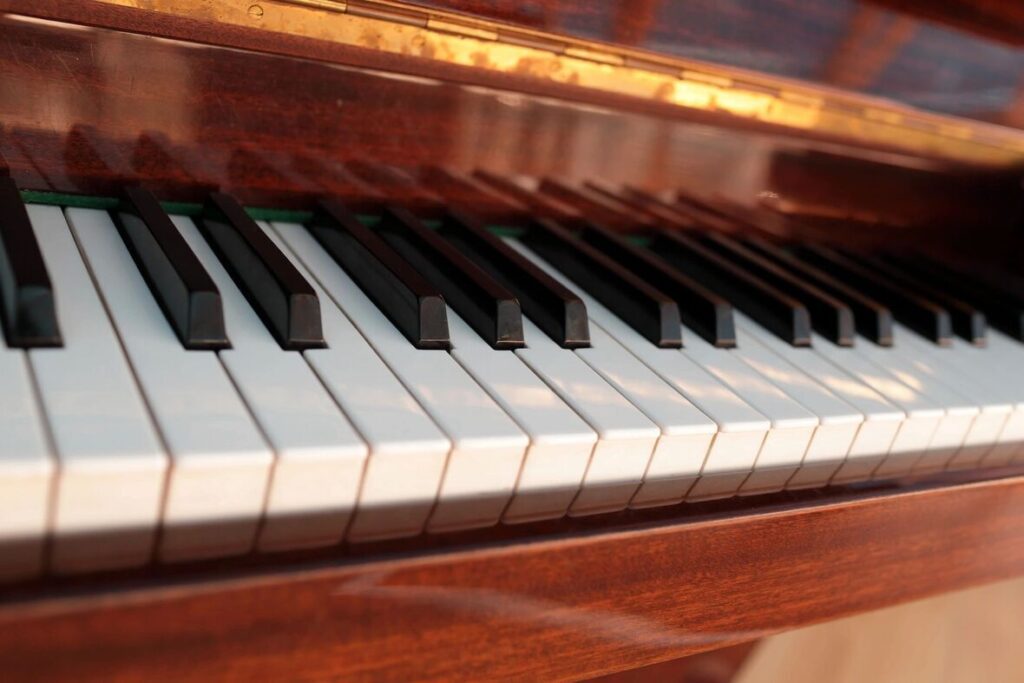Today’s Word from Sheila Weidendorf
As most of you know, I make music… a LOT of music. There’s my core endeavor– performing western classical chamber music in collaboration with many fine musicians. At any given time, I typically have 5-6 concerts worth of music in some stage of practice, rehearsal, performance, or recording. I also devote a reasonable amount of time to recording my own solo improvisational piano meditations and have a new improvisational trio to perform with. And then there’s my happy work as Trinity’s resident keyboardist. As it happens, I spend a RIDICULOUS amount of time at the keyboard.
Of course, during the Covid years, I had fewer public concerts and honestly enjoyed the respite from what has been a very, very public life. That is shifting again now– I find myself more and more in the public eye and I must say that it feels strange. I am inherently a very private person with strong hermit-y tendencies. I am not shy, but I do require significant alone time for my musical, personal, and spiritual well-being.
Something that comes up over and over and over again with regards to my music is the subject of “talent.” Anyone with any degree of accomplishment at their musical or otherwise artistic craft tends to hear the kindly refrain, “You’re so talented!” While I can appreciate being appreciated (who doesn’t?!?), the idea of “talent” is a bit of a stickler with me. After all, talent isn’t something I or anyone “deserves;” it’s neither something I created nor something gained as a reward for good behavior. We are all born with varying gifts and graces — as well as challenges!
It is true that I have been granted a proclivity for music. I cannot NOT make music—it’s my heart, my soul, my passion. But it is also my work — my very good, hard work. I just realized the other day that (yikes!) I have been playing the piano now for 52 years. It is thus reasonable to expect I be at least somewhat adept at my craft, given the countless hours I have spent exploring the repertoire, deepening my understanding and really working at developing my technique so as to be of maximum service to Music.
And this is the crux of this little story: We ALL have our work to do in this world, our offerings to make to the greater good. Whatever our gifts may be, they are meaningless and useless if not developed, honed, polished. And that takes devotion and perseverant practice. And there’s no end zone — there will always be more scales to practice, notes to learn, technique to further polish, concerts to perform.
But behind all this “visible” evidence of my proclivities and commitment to my musical endeavors is the greater truth of the whole enterprise — of anyone’s enterprise or work in the world: What is the instrument I must practice? Ultimately, it’s not the piano I must practice. It’s me. If my talents are to be of use in this world, I must become the instrument. I am the string that must be tuned so that the beautiful mystery of God — this music of the spheres — might pass unimpeded through me. Talent is as talent does, after all. If my music is a gift to me from God, then let me please be a worthy instrument of God in my endeavors on this earth.
To be a good pianist — or painter or poet or prophet or preacher — is to be willing to become the string that is to be tuned to the key of creation. In this light, to make use of one’s God-given “talent” is not an accomplishment. Instead, it is more a willingness to surrender to the hand that would keep us in tune.
In Hinduism and Buddhism, it is believed that one can attain a state of union with God in full bliss and enlightened realization, a state called “samadhi.” Whether through meditation or devoted service, samadhi is a state of complete surrender to God. And just as Pastor Tom said in a recent sermon, we all were born with a little bit of God in us.
“Talent” is only that — a possibility born of that little bit of God in us. To employ that little bit of God in our early work is an act of devoted surrender — a kind of samadhi with the Holy. In this I am reminded of the Prayer of St. Francis:
Make me an instrument of your peace.
Where there is hatred, let me bring your love.
Where there is injury, your pardon, Lord,
And where there’s doubt, true faith in you.
Make me an instrument of your peace.
Where there’s despair in life, let me bring hope.
Where there is darkness, only light,
And where there’s sadness, ever joy.
Oh, Master, grant that I may never seek
So much to be consoled as to console.
To be understood as to understand.
To be loved as to love with all my soul.
Make me an instrument of your peace.
It is in pardoning that we are pardoned,
in giving of ourselves that we receive,
and in dying that we’re born to eternal life.
I shall leave you with one of my improvisational meditations entitled, Samadhi (Santoor) click HERE to listen.
Much love,
Sheila



